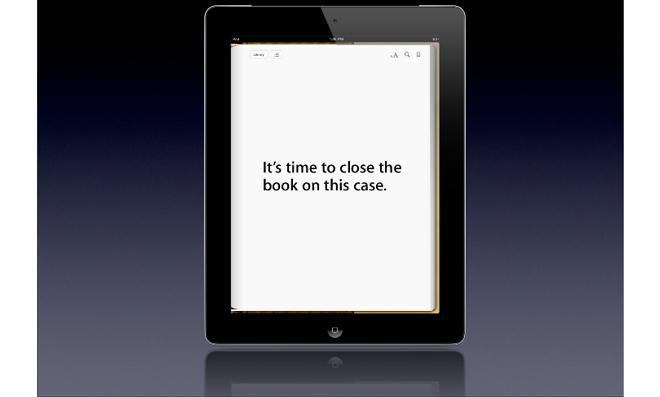Apple's appeal of the U.S. government's e-book antitrust case got underway Monday, with one judge presiding over the hearing questioning whether the government's original case was legitimate.
In the appeal, Apple hopes it will be able to overturn a verdict that found it and book publishers guilty of a price fixing conspiracy. If Apple can win the appeal, it will pay no penalty, but if it loses, it must pay $450 million in damages and attorney's fees.
Judge Dennis Jacobs is one of three appeals judges hearing the case. On Monday, he appeared to question the government's pursuit of Apple.
As hearings got underway on Monday, Judge Dennis Jacobs — one of three judges on the appeals panel — was seen as "openly hostile to the government's case," in a report by AFP. Jacobs appeared to doubt the government's case against Apple, and expressed his view that the iPad maker was taking on "predatory pricing" strategies by the dominant player in the e-book market, Amazon.
"What we're talking about is a new entrant who is breaking the hold of a market by a monopolist who is maintaining its hold by what is arguably predatory pricing," Jacobs reportedly said.
Apple officials have said they continue to fight the case out of principle, because the company exists that no illegal collusion took place between itself and book publishers, even if book prices did in fact rise.
In its appeal, Apple has pointed out Amazon's continuing dominant position in the e-book market. At the time of the iBookstore's launch, Amazon accounted for nine out of every ten e-book sales.
Under negotiations led by Apple executive Eddy Cue, the Cupertino, Calif., company and book publishers opted to switch to a so-called "agency" pricing model. That prevented content owners from being able to sell the same titles at a lower price elsewhere, without offering the same price on Apple's iBooks platform — a "most favored nations" clause.
In contrast, the e-book industry prior to the launch of the first iPad was under the "wholesale model" preferred by Amazon. In that model, resellers such as Amazon had the power to set prices, selling titles at or below cost if they chose to do so.
Apple has argued that publishers openly discussed their desire to raise prices on books, as they felt titles were being sold for far too little by Amazon under the wholesale model.
As a result of the U.S. government's ruling, Apple is saddled with an injunction that bars it from entering into any unsavory deals with publishers, and the company is under the watch of antitrust monitor Michael Bromwich. The iPad maker's appeal was formally filed in February of this year, asking for a dismissal or a retrial.
 Neil Hughes
Neil Hughes

-m.jpg)






 William Gallagher
William Gallagher
 Andrew O'Hara
Andrew O'Hara
 Wesley Hilliard
Wesley Hilliard

 Malcolm Owen
Malcolm Owen
 Marko Zivkovic
Marko Zivkovic

 Chip Loder
Chip Loder




-m.jpg)




39 Comments
I question the legitimacy of the government's case too!
We currently have one of the most incompetent and corrupt DOJ to ever exist. They have nothing against Apple, it is a witch hunt.
Screw the thugs in the DOJ!
Apple should bring this all the way to the top, to the Supreme Court, if needed.
Any illegal ties between Amazon and the Govt should also be investigated.
Good. It seems rather clear that the original judge had pre judged the case and cherry picked evidence. And that Amazon was no saint. It's nice to see that the appeals group isn't alk anti Apple. The other two and the evidence will have to fight to convine this guy. As it should be
You never know, and the DOJ has yet to present its side, right? You just never know what machinations lead a person to make one decision or another.
Good to read.
I like this judge.
But wait, he's agreeing with Apple? Quick, somebody dig up his history and financial records. He must be an Apple shareholder. Or his family all got new iPads and iPhones for Christmas. Gotta be something.